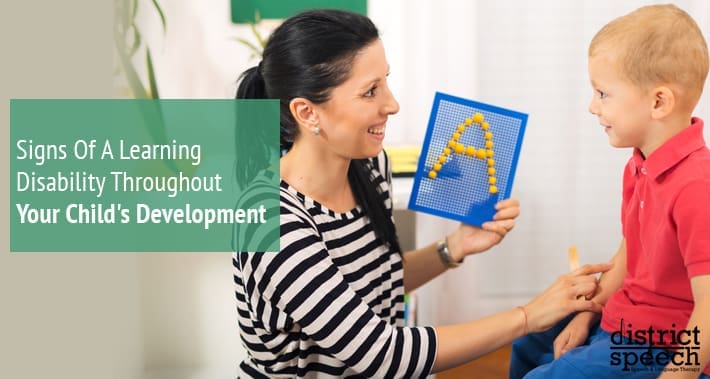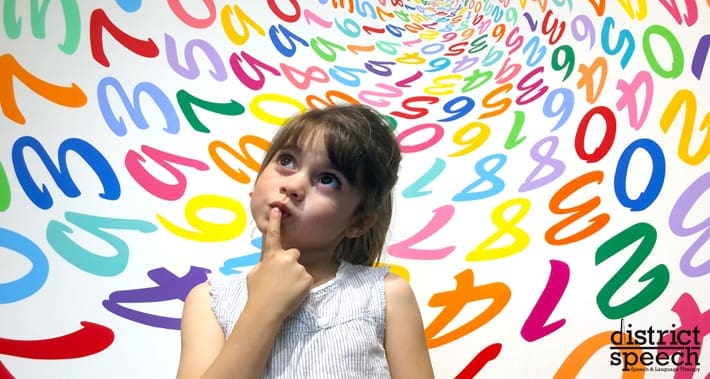
Does your child have difficulty with school?
Have you noticed they’re having a difficult time with language and reading?
It’s possible they’re showing signs of a learning disability.
There are many different types of learning disabilities in children.
Learning disabilities can result in difficulty understanding your right from left, reversing letters in words, and understanding instructions.
This can make it so they learn in different ways from other children.
This doesn’t mean they can’t be successful in their educational journey.
Early detection and intervention could help your child address these problems with speech therapy for learning disabilities.
Let’s take a closer look at how to recognize the signs of a learning disability.
What Is A Learning Disability
The prevalence for learning disabilities varies depending on the country.
In the US, the prevalence of learning disabilities is around 9% in children aged 6 to 17 years of age.
These learning disabilities impact how your child sees, remembers, understands, and uses verbal and non-verbal information.
Ultimately, learning disabilities are related to language.
For example, imagine someone asking about your day.
You’d probably recall what you did or how you felt and describe it without a second thought.
A child with a learning disability might know exactly what they want to describe, but have trouble finding the right words to say it.
Children with these disabilities may end up getting frustrated when they can’t figure things out.
This may be exasperated when these issues persist even when they try their hardest.
These disabilities can occur along with other behavioral or emotional issues, such as attention deficit hyperactivity disorder or other mental health issues.
It’s important to address both the learning disability, and the comorbid conditions that can come along with it.
This can help your child live a fulfilled life.
Types of Learning Disabilities
There are different types of learning disabilities that can create different problems for a child.
Speech therapy for children can address each of these.
Continue reading below to learn about some of the different types of learning disabilities.
Dyslexia
Dyslexia is a learning disability connected to the part of the brain that processes language.
As a result, a child with Dyslexia can struggle with reading, writing, spelling, and speech.
There are many different types of dyslexia and also many myths associated dyslexia.
An example of dyslexia is dysnemkinesia, where people struggle with letter and number formation when they write.
Other types of dyslexia may involve issues with auditory skills, and trouble reading written words.
While this can feel intimidating, kids with dyslexia can understand what you say aloud just as well as anyone else.
And, speech therapy treatments for kids with dyslexia are available and can help.
This treatment geared toward helping them manage their dyslexia.
You can also help your child with dyslexia by taking part in helping them learn to read.
Along with occurring in children, dyslexia can also occur in adults.
Adults can have dyslexia too, so speech therapy for adults with dyslexia can help.
Dysgraphia
Have you ever come across handwriting that’s so difficult to read it looks like one word bleeds into the next?
Dysgraphia is a learning disability that causes problems with writing.
A child exhibiting dysgraphia might have trouble forming letters correctly or writing proper sentences.
Dysgraphia can cause issues in your child’s social development.
There is currently no known cure for dysgraphia but speech therapy for dysgraphia can help.
This can help your child live a more fulfilled life.
You may also develop dysgraphia as an adult.
The cause of this is usually a stroke or another brain injury.
In this case, one of our speech therapists for adults can help.
Dyscalculia
Dyscalculia is a condition that makes it hard to do math and tasks that involve math.
You might have problems learning number related concepts.
If you have dyscalculia, your brain won’t process math and number related concepts the same as everyone else.
Auditory Processing Disorder
Due to the name, you may think auditory processing disorder is hearing loss.
This is not the case.
An auditory processing disorder sensory issue that affects how you understand language.
Your brain and your ears are not aligned in terms of processing sounds.
Words that are similar will sound like the same word.
A child with an auditory processing disorder may have difficult recalling the details of instructions their teacher said.
This can be caused by:
- traumatic brain injury
- Premature birth
- A seizure disorder like epilepsy
- Other disorders

What Are The Warning Signs Of A Learning Disability?
The signs of a learning disability can be difficult to spot.
Maybe a teacher has expressed concerns that your child is struggling with reading, writing or math despite being otherwise quite bright.
Or, perhaps you’ve noticed they struggle to turn sounds into words, even when they seem to know exactly what they want to say.
Small memory concerns, like regularly noticing your child has difficulties recalling the details of a story they enjoyed can also be important forewarning.
By being attentive to your child’s behaviors is a great first step to recognizing the warning signs.
Keep reading to explore behaviors children at different age groups may exhibit if they’re struggling with a learning disability.
Signs Of A Learning Disability In Preschoolers
How do you notice the signs of a learning disability in a child just beginning to use and understand language?
In preschool aged children, the following problems can be warning signs of a learning disability:
- Challenges with learning or understanding the alphabet
- Having difficulty remembering or understanding the words to songs or rhymes
- Problems matching sounds to letters
- Difficulty remembering numbers or counting in order
Signs Of A Learning Disability In Primary School Children
Once your child reaches school age, the above concerns are still a factor.
However, you may notice a variety of new potential signs, including difficulty with:
- Doing basic math or remembering the order of numbers, like a phone number
- Being able to tell time
- Understanding what they read
- Spelling properly
- Learning new words either through reading them or hearing them
How Can Speech Therapy For Learning Disabilities Help?
Speech therapy might not be something you’d think of benefiting a child with a learning disability, but it can.
Speech, writing, and reading are all connected.
If a child has a learning disability, they may have issues with their writing, reading, or speech.
They may benefit from speech therapy.
While we’re commonly known as speech therapists, our full and proper name is speech-language pathologist.
This is because we know how to recognize the signs of a speech or language disorder in children and adults.
We also treat them.
The issues we address include learning disabilities.
If you suspect your child has a learning disability, it’s a good idea to book an appointment with a speech therapist for an evaluation.
Your child’s speech therapist will evaluate how well your child listens, speaks, reads, and writes.
From there, if it seems like your child has a learning disability, they will put together a treatment plan designed to address your child’s unique needs.
This may include:
- Helping them learn to read
- Exercises to match letters with the sounds associated with them
- Writing exercises
- Recalling the details of a story they read
- Using their strengths to reinforce their weaknesses
The approach your speech therapist takes will depend on what your child’s strengths and weaknesses are.
However, in general, early intervention in learning disabilities can help.
It helps your child overcome their learning disability, giving them the best shot at life.
Book Your Appointment With District Speech Today
Are you noticing the signs we talked about today in your child?
If you suspect your child has a learning disability, the best thing you can do is intervene early.
Book your appointment with District Speech today.
1300 I St NW, Suite 400 E,
Washington, DC 20005
- https://g.page/districtspeech
District Speech and Language Therapy specializes in speech therapy, physical therapy, and occupational therapy solutions, for both children and adults, in the Washington D.C and the Arlington Virginia areas.